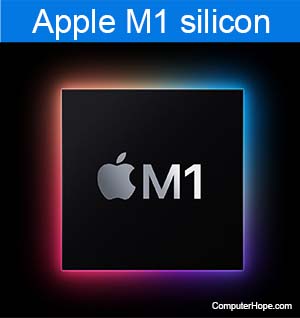Custom silicon

Popularized in recent years by companies like Apple and Google, custom silicon is specially-designed SoC (system on a chip) or processor designed by the manufacturer of a device. Traditionally, CPUs (central processing unit) are purchased from established silicon companies, like AMD or Intel. Manufacturing first-party chips, however, is more cost-effective in large quantities and allow the processor to work more efficiently with existing computer, smartphone, or tablet components.
When someone refers to Apple silicon or Google silicon, it describes the custom chips that are made for these devices. While the design of these custom silicon chips is proprietary, their manufacturing is often outsourced to other companies. Apple's M1 chip in the 2020 MacBook series, for example, is produced by TSMC.
Examples of custom silicon
Listed below are the various silicon chips that are developed by companies adopting this business model.
- Apple M Series - Apple released for the 2020 MacBook lineup, the Apple M1 chip is now available in every MacBook variation. Consumers can choose from the M1 and Intel versions of the MacBook when purchasing a device from 2020 or later. The M1 Pro and M1 Max was later introduced in 2021 for Macintosh computers.
- Apple A Series - The Apple A4 chip was unveiled with the iPad in 2010 and later used in the iPhone 4. Since then, Apple has released new A Series chips with each iteration of the iPhone.
- Google Tensor - Released with the Google Pixel 6 in 2021, the Google Tensor chip replaced the Qualcomm CPUs used in previous Google Pixel smartphones.
- Tesla Dojo - In September 2021, Tesla, who had previously used NVIDIA chips, unveiled the Tesla D1 chip, for use in the self-driving Autopilot AI (artificial intelligence) found in all Tesla cars.
Apple terms, CPU, CPU terms, Electronics terms, Hardware terms
